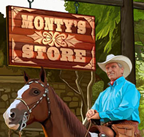Rewards
Subscribe to Equus Online University and become a part of Monty's worldwide mission to leave the world a better place for horses and for people too.
Students automatically gain access to special rewards, such as exclusive discounts at the Monty Roberts Online Shop. Visit Monty Roberts Online Shop.




What an interesting question!
To attempt an answer - or rather; to offer a theory - I need to get into what causes the condition in humans. Because no one (as far as I know anyway) has studied this in horse brains.
In humans it has been seen in various studies to be caused by anomalies in the impulse transference of dopamine mainly to the parts that controls attention, impulse control and regulation of activity. A person with this condition will (according to the most recent research that advocates a biochemical explanation model) have problems with executive functions in brain processes like impulse control, planning, organization, coordination and to access the work memory, which is in control of your ability to keep more than one thing at a time in your mind as well as sorting out earlier experiences so you can use them to learn from them.
The condition is most likely caused by genetic inheritance rather than stress, bad upbringing or trauma, although all those can certainly enhance it.
With this in mind, we have to ask ourselves if the brain of a horse works in the same way human brains do? My thoughts are that it doesn't. For one thing the two halves are just barely connected to each other, so - while nothing should be ruled out without a scientific proof - I doubt horses can actually have ADD or any other letter combination.
That said, I can see how this question could arise, and I have been toying with a thought about the problem horses have with taking in lots of information at the same time, could cause behavior that could be compared to that of people within the autistic specter.
BUT to go from there to say that a horse is autistic is probably a leap too far.
These are just my thoughts on the subject, of course. I hope others will chip in here too, because it really is an inte´resting question that should be addressed.
A follow up would be; IF horses could have autism - then how should we deal with them? In my mind, if we follow Monty's concepts, we have a pretty good thing going already, because the incremental and violence free training gives any horse the tools it need to learn without being overwhelmed.